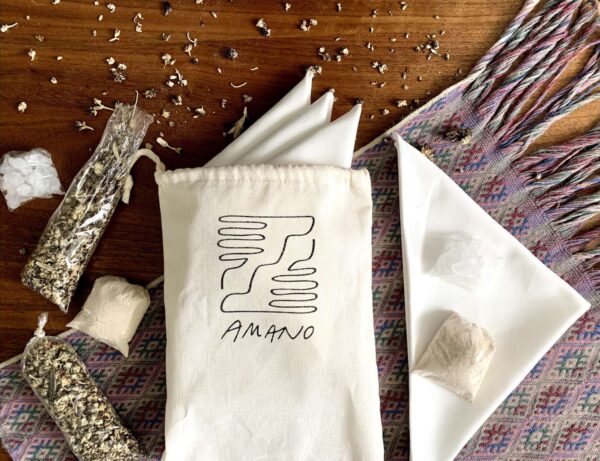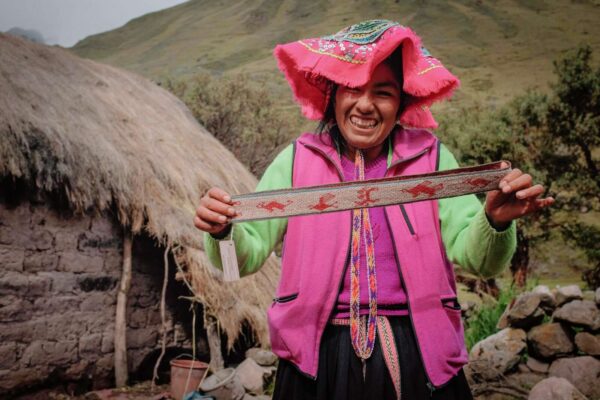Sponsored by Monday Properties and written by ARLnow, Startup Monday is a weekly column that profiles Arlington-based startups, founders, and other local technology news. Monday Properties is proudly featuring 1515 Wilson Blvd in Rosslyn.
When the pandemic hit, Elena Laswick scrambled to keep afloat her five-month-old brand selling artisan-made textiles from Guatemala.
After working for nearly five years with the indigenous Ixil Maya people to increase their textile sales, she launched her own brand to ethically sell their wares.
Elsewhere, Brooke Loving Bagwell was doing the same thing, with her brand amplifying weavers from Cusco, Peru.
Although they worked in the same niche industry, they didn’t connect until the pandemic, when Bagwell sought out Laswick for support. Their conversations evolved into the idea for Amano Marketplace, an online marketplace where Central and South American artists collectives could sell their products for prices that sustain their artisans and communities.
“The idea was born June of 2020, and we got everything online by Oct. 1, 2020,” co-founder Laswick tells ARLnow.
The last year has been spent planting the seeds for a recognizable company and waiting for them to grow.
“I think that marketing takes time. If you want to do it quickly, it takes an insane amount of money, so we’re going the time route,” said Laswick, who is also tapping into her connections in the fair trade world. “It’s just a matter of waiting for it to be recognized and waiting for the things we’ve put in motion to have a result.”
Laswick envisions Amano (which means “by hand”) as somewhere customers know they can get an ethical gift that supports Indigenous and Latin artists. For artisans, Amano would guarantee a certain number of monthly sales.
That’s not happening yet, but the marketplace is helping collectives connect with customers, she said.

She and Bagwell incorporated Amano Marketplace in Arlington in February 2021. For the past 11 years, Courthouse has been Laswick’s home base when she isn’t in Guatemala. It’s als where orders are fulfilled.
Laswick got into Guatemalan textiles after working with a non-governmental organization called Mayan Hands. Meeting with Ixil artisans, she fell in love with their work and resolved to partner with them.
“The weavings of Guatemala draw everyone in. It’s impossible not to be drawn in, in my opinion,” she said.
Laswick’s stint with Mayan Hands taught her that Ixil weavers make fewer sales because they’re cut off from the international textile community, living in a region isolated from tourists, and market demand isn’t that high.
That’s why Amano is tapping into a consumer base that seeks out ethical products hand-made by women and underrepresented peoples.

The artists with which Amano works have to fight for living wages and appropriate uses for their weavings — adding insult to the injuries of colonization and a 1980s-era genocide that targeted them, Laswick says.
Inappropriate uses can look like an outside vendor buying weavings that were not made for sale, turning the cloth into shirts and handbags and selling these products for significantly more than what the artists received, she explains.
“This isn’t really ethical,” Laswick said. “There are so many weaving cooperatives that are desperate for work, there’s no need to up-cycle those things when you can get them new and ensure the wage of a producer. It can’t be considered fair when you have no idea what percentage of the final product goes to weavers.”
That’s why Amano partners with local artist cooperatives.
“We’re wanting to work only with organizations and designers and individuals who are aware of and respect that cultural heritage of weavings and traditional techniques,” she said. “The textiles are not something repurposed for sale, they’re created with the intention to be sold.”
In Guatemala, some of that heritage was lost to colonization and war, she said. But weaving survived and took on additional meaning.
“Most generically speaking, the textiles have been referred to in Guatemala as ‘the books the colonists couldn’t burn’ — a way of transferring stories, images and beliefs through weaving and connecting with pre-colonial history and culture,” Laswick said.


